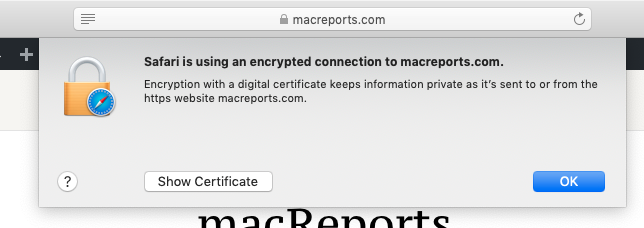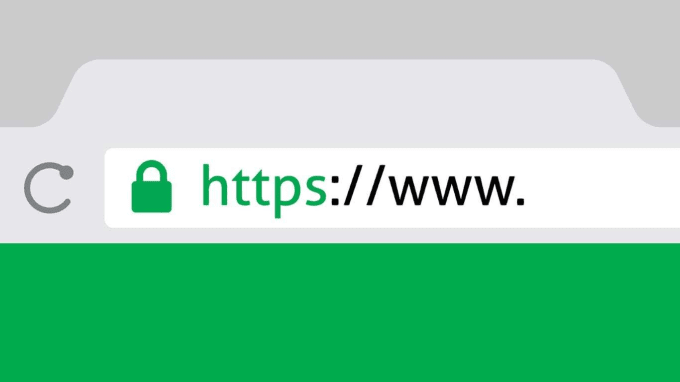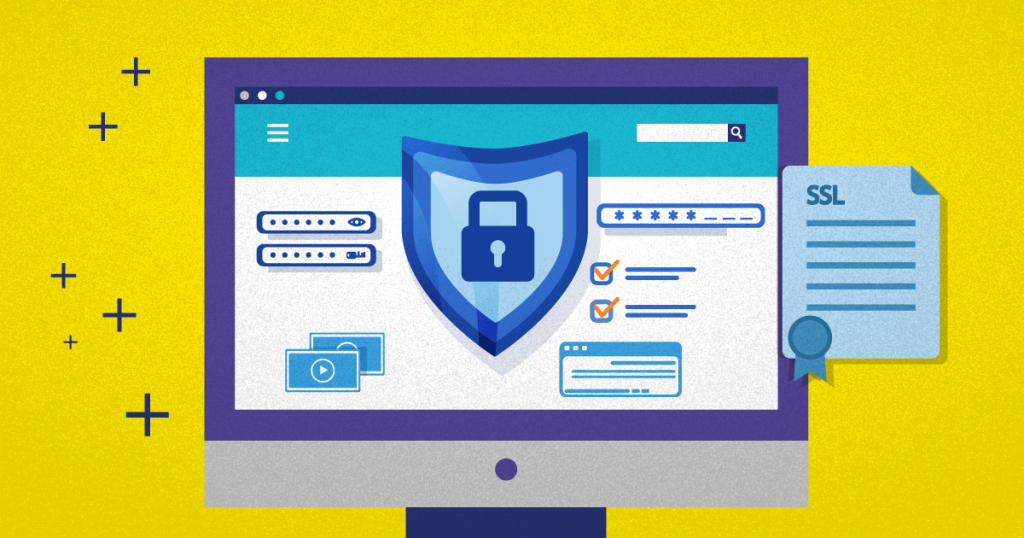When making a purchase, downloading a file, or simply consuming digital content, the user needs to feel safe. That’s why any brand that wants to offer valuable experiences to the persona needs to invest in website security. So, it’s time to get an SSL Certificate.
In addition to protecting the audience, this will protect the brand’s own data from hacker attacks and other types of threats.
Achieving the proper degree of security involves several techniques, but few are as critical as the use of an SSL certificate. It has become a sort of quality indicator, causing users to avoid visiting pages that do not contain this electronic document.
Between 2016 and 2019, the percentage of websites protected by SSL jumped from 40% to 80%.
They are, as studies show, the favorites among users. In Google Chrome, for example, 90.2% of the browsing time is spent on websites that offer this extra layer of security.
Looking at these numbers, it is clear that not investing in this type of protection means giving up an important audience and wasting your web potential. But don’t worry! In this text, you will learn:
- What is an SSL Certificate?
- How does it work?
- What types of SSL Certificates are there?
- Why you should use an SSL Certificate?
- How to install an SSL Certificate?
- Why is it important for e-commerces?
- How to improve the security of your website?
 hbspt.cta.load(355484, ‘104906ab-9484-425b-b101-a6a478d876cb’, {});
hbspt.cta.load(355484, ‘104906ab-9484-425b-b101-a6a478d876cb’, {});
Download this post by entering your email below
What is an SSL Certificate?
The SSL (Secure Socket Layer) certificate is a standard security protocol on the Internet, used to encrypt the information exchanged between two network users.
This occurs every time someone makes a purchase in a digital store, leaves their data on a landing page, or performs any other routine activities on the web.
Cryptography transforms the information into codes that can only be understood by the parties involved in the process.
Thus, both the website and the visitors are protected from eventual hacker attacks, since even if the information is captured by third parties, they will not be able to understand them.
This way, the SSL certificate becomes fundamental for the user to access a qualified and safe experience.
And they will look for it. Internet users can easily know whether or not a website has the certificate: all they need to do is check if the acronym HTTP, which appears at the beginning of the URL, contains the letter S at the end, forming HTTPS.
In addition, sites protected by an SSL certificate display a padlock in the search bar.
By clicking on the icon, the user receives from the browser a disclaimer about the security status of the website, in a message like the one shown below.

How does it work?
All data made available by the user during their experience on the website is encrypted and can only be accessed by those who hold the correct key.
In this case, two keys are generated, one that is held by the user and another which is kept by the host server.
So, let’s imagine that the user decides to make a purchase on your website, where they leave sensitive information, such as credit card data.
Even if a hacker intercepts the message sent by the user before it reaches the server, it will not be possible to view it without the encryption key.
Besides encrypting those interactions, SSL also serves a very important purpose to the consumer.
The lock displayed next to the URL (or other reassuring symbols, depending on the SSL type) assures the user that the page they are accessing is, in fact, what it says it is.
Thus, an SSL certificate becomes, in addition to a security factor related to the operations within the site, a seal of warranty that encourages your visit to the website in the first place.
With a very interesting approach, the video below illustrates how the SSL certificate works. Take a look!

What types of SSL Certificates are there?
At this point, you have an overall understanding of how SSL Certificates work and what they are used for.
Now, let’s go deeper into the subject and talk about the various types of SSL available, detailing their specifics.
Understanding the difference between each one of them and the most favorable situations for them to be applied is fundamental for you to choose the best SSL for your company’s specific reality.
Keep reading!
Extended Validation (EV) SSL Certificate
Remember we mentioned that the symbol displayed in the URL may vary according to the type of SSL purchased?
Extended Validation SSL is one of those that shows the padlock, which, being one of the most well-known security-related symbols, ends up conveying more credibility to the user.
In addition to the padlock, the certificate also shows in the address bar elements such as the name of the company and the country where it is located. Besides, of course, it inserts the “S” in HTTPS.
It is a complete certificate and one of the most commonly used in the market, which also makes it one of the most expensive options.
However, such an investment is worthwhile especially for companies that value actions to confirm their identities. It is the most recommended option for websites that process digital payments, for example.
Organization Validated (OV SSL) Certificate
As the name indicates, the main function of this type of SSL certificate is to attest the existence of your organization and your domain. OV SSL also features an average level of encryption, involving two-step verification.
The first step is performed by the Certificate Authority (CA), which verifies who owns the domain and whether the company behind it has fulfilled the legal requirements to operate.
If all checks out, the CA will display a small green padlock on the search bar, followed by the company name.
Although this type of certificate is not as complete as an EV SSL, it is an excellent option for companies with a smaller budget that want to offer some level of security to their users.
Domain Validation (DV) Certificate
The Domain Validation (DV) is another certificate that displays the green padlock as a security guarantee for users.
This type of certificate represents the fastest way for a company to get validation on the Internet, offering a very simple process.

To get the validation, you only need to fill out an application that requests the submission of some documents. For that, you need to add a DNS to the CA, which will verify if the applying company has authorization to claim the domain in question.
The negative point of the DVs is that they do not act on the subdomains, being restricted to the top-level domain itself.
Moreover, this type of certificate does not work with any type of identity data, so it is not possible to know who is receiving the encrypted information.
However, if you can’t invest in a more complete (and expensive) solution, DV SSL gets the job done.
Wildcard SSL Certificates
If you have many subdomains, the Wildcard SSL certificate is a very relevant option. This is because this type of SSL allows you to use the same certificate for the domain and for the subdomains.
For example, let’s say you own the domain mysite.com. If you invest in a Wildcard SSL, you can also cover subdomains like blog.mysite.com and mail.mysite.com. That’s right. You kill 3 birds with only one stone.
This way, this type of SSL is a much more affordable option than investing in multiple SSL certificates to cover all your domains and subdomains.
Unified Communications (UCC) SSL Certificate
Unified Communication Certificates (UCCs) are also known as Multi-domain certificates.
The reason for such a name is simple: this type of certificate allows you to include up to 100 domains at the same time, facilitating communication between browsers and servers.
Like other formats, the UCC uses a padlock in the address bar to signal that the domain is secure. In addition, it can be configured to act as EV SSLs, i.e. display the green padlock instead of the regular one.
Single Domain SSL Certificate
This is the simplest SSL certificate format. A Single Domain SSL certificate covers only one domain, excluding subdomains and other websites you may own.
This is an option to be used in less robust digital strategies.
Why you should use an SSL Certificate?
Digital security is a growing concern among consumers, whether in B2B or B2C commerce.
This happens thanks to a scenario in which operations carried out over the Internet become increasingly complex, creating a large flow of personal data and sensitive information.
It is no wonder, for example, that regulations on the use of user data, such as GDPR, have been implemented around the world.
Legislative institutions recognize the relevance of digital security and seek the means to force companies to value safe experiences for their consumers.
Attentive to the news, consumers also become more demanding.
And they should be! After all, even with all the measures taken to guarantee the security of digital experiences, the threats represented by hackers and malware did not stop growing.
Take a look at the graph below:

If the amount of threats on the Internet is on the rise and consumers increasingly value their own security, you already have a solid reason to invest in SSL certificates.
These features make your website visitors feel like they are in a safe environment, where they can consume your content and make purchases without worrying about data leaks or malware infections.
More than that, SSL protects your own data. For example, if you use a CMS for marketing, you probably store the content and information related to your campaigns on its databases.
Protecting these assets is essential to ensure consistency of strategy without harming the editorial calendar.
How to install an SSL Certificate?
Now that you know what it is, how it works, and what purpose an SSL certificate serves, let’s explain how you can install it.
To start, you need to know where to get them and the answer is simple: from a Certificate Authority.
CAs are outside organizations, trusted in the market, that generate and make available different SSL formats.
CAs sign the certificate with their own encrypted keys, allowing customers to check its validity. This process can include a fee, but there are free options.
Once the certificate is generated, you must install it on the original server of your website. This can be a bit of a complex task, but if you have a quality web host, it is likely that the service provider will handle that part.
Once SSL is enabled on the source server, your pages will become capable of loading over HTTPS. From this point on, all traffic recorded on the website will be encrypted.
Why is it important for e-commerces?
Because it generates trust. There’s nothing more important to digital consumers than secure experiences. After all, no one will provide credit card data if there’s a chance it will be captured by malicious parties.
So, if you want to fully explore the potential of your e-commerce, you need to invest in an SSL certificate.
In other words, the absence of an SSL certificate puts the digital security of your users at risk, who, if informed about the relevance of this issue, will not even risk browsing your pages.
In addition to the financial damage caused by lost opportunities, this situation contributes negatively to the image of your brand, which will consequently lose relevance in the digital environment.
How to improve the security of your website?
Besides SSL certificates, there are several other elements that contribute to the security of a website.
To ensure safe experiences, you should really put this goal as one of the main ones in your company. In other words, digital security must be part of your organizational culture.
This involves, among other things, training employees to ensure that they use best practices to prevent data leaks or security breaches.
If you use WordPress to manage your website, you can make use of its extensive directory of plugins, which include options specifically focused on security. Examples are:
- Sucuri
- WordFence
- Defend
- VaultPress
Finally, you need to know how to choose a good web host. Different solutions on the market offer varied security features.
You need to carefully analyze and choose an alternative that takes into account the needs of your company, not only in terms of security but in everything that covers the strategy.
Investing in SSL certificates is important for your website and your visitors’ security.
This feature generates trust for your brand and prevents you from suffering from problems related to hacker attacks and malware infections. Analyze the different SSL options and choose the one that best fits your reality!
What about using a web hosting service that, besides providing greater security for your site, optimizes your marketing efforts and facilitates the management of your content? Meet Rock Stage!
<!–[if lte IE 8]><![endif]–> hbspt.cta.load(355484, ‘77903bea-057f-45df-ad4b-d630d028ed83’, {});
hbspt.cta.load(355484, ‘77903bea-057f-45df-ad4b-d630d028ed83’, {});







